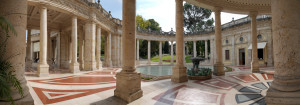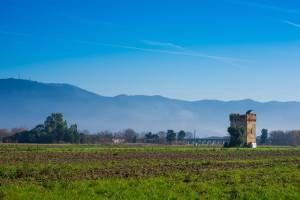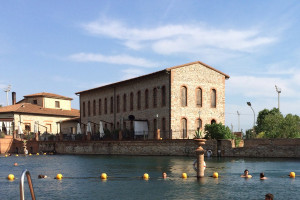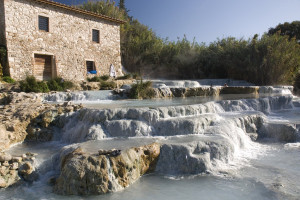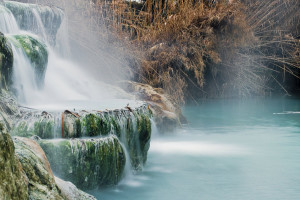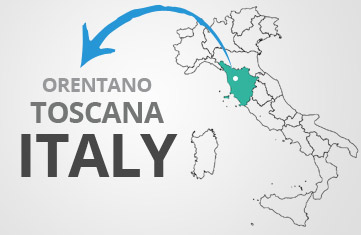Splendid waterfalls and stunning natural pools covered in thick clouds of steam and vapour, extraordinary limestone grottoes, expert hands to look after you, activities in the open air completely immersed in the scents and colours of the Tuscan countryside: this is the “region of the spas”, Tuscany.
What Tuscany has to offer in the world of health spas is synonymous, the world over, with excellence and the high quality of the services provided, from beauty treatment to medical care.
Get rid of stress and let yourself go with the pleasure that a spa can give you? All you have to do is decide where to go, given the vast choice of spa resorts in Tuscany where one can hang out and chill out.
Montecatini Terme, vital core of the Valdinievole area, is one of Italy’s best known spa resorts making tourism the economic mainstay of the area.
Montecatini, once an impregnable fortress, was taken down stone by stone by order of Cosimo de’ Medici and the zone became unhealthy due to the stagnation of the waters. Later, encouraged by Gran duke Leopoldo, the land was reclaimed and the first spa baths were built at the Tettuccio, the Bagno Regio and the Terme Leopoldine. In the years at the turn of the last century, the city managed to get the formula right for tourists and, as a matter of fact, it was not unusual to meet personalities like Giuseppe Verdi, Pietro Mascagni, Ruggero Leoncavallo, Trilussa, Luigi Pirandello etc. and its notoriety was spread even further by the visit of the head of the government, Mussolini, 16 May 1930.
A small part of the borough of Montecatini Terme is Montecatini Alto (historic village formerly the head town with the name Montecatini Val of Nievole), connected with the underlying city via the cable car that still uses the original wagons from 1898, (and is the longest running cable railway in the world).
The saline-sulphate-alkali waters of Montecatini Terme are unique and contain precious elements for renewing the organism such as: bromine, calcium, chlorine, iodine, lithium, magnesium, potassium, sodium and sulphate. In the 8 spa establishments one can choose from a range of treatments, such as: hydropinic therapy, mud therapy, balneal-therapy, inhalation treatment, medical and therapeutic massage, salt grottoes, massages, sauna and Turkish bath.
Monsummano Terme is another spa centre in the Valdinievole that rose to fame in the 19th century thanks to Ferdinando Martini (writer and politician) and a Giuseppe Giusti (poet).
Somewhere in the Garden of Eden and nowhere else in Italy lies the Giusti Grotto: a thousand year old grotto, set in carbonate rocks protected by the hill above, covering more than 200 metres underground, creating labyrinths in the subsoil, decorated with stalactites and stalagmites and large caverns. At the end of the cavern a steaming underground lake of crystal clear water, producing therapeutic vapour.
The thermal water of the Grotta Giusti natural spring is a mineral water containing bicarbonate, sulphate, chloride, magnesium and calcium and reaches the surface at a temperature of 34-35°C.
http://www.termemontecatini.it/
http://www.montecatinibenessere.it/centri-termali/terme-di-monsummano
http://www.grottagiustispa.com/
Montecatini Terme – 19 km (18 min)
Monsummano Terme – 20 (20 min)
Known in ancient times as Acquae Pisanae and as the Baths of Pisa, San Giuliano Terme is the location of an important spa and of one of the few waters that flow oligo mineral straight from the spring; the spring is also one of the main water basins that serve nearby Pisa.
The thermal waters, that flow at a temperature of 37° C, are sulphate-calcium-magnesium and are particularly appreciated for their quality and tolerance.
Locality known in ancient times for its thermal spring spouting bicarbonate-alkali-ferrous water, its use has
given birth to a flourishing industry at Uliveto Terme, known since the Middle Ages for the treatment of epidermal diseases (above all, scabies).
The modern spa resort is exclusively dedicated to hydropinic (drinking) therapy even though the baths were used right up until the last century. The water spouts from underground at a temperature between 22° and 34°C. Its consumption is indicated for those who suffer from liver, kidney or gastrointestinal disorders.
Set in a large garden, the spa resort caters for leisure in general, thanks to a swimming pool and 2 tennis courts. The spa has a meeting hall much used for medical and sporting conventions.
Casciana Terme’s history is deeply tied to the therapeutic properties of its water, giving birth to the thermal baths. Its origins are recounted in a romantic tale that goes back to the times of Countess Matilde of Canossa (1046-1115), who had an old dying crow who healed himself by diving in a pool of thermal water. The Countess believed that the animal recovered thanks to those waters, and therefore decided to build baths, the beginnings of the spa resort.
The spa water at Casciana is called Acqua Mathelda and spouts from a spring at a constant and natural temperature of 35,7° C. It belongs to the family of bicarbonates-sulphates-calcium, and used since time immemorial as a cure for arthritis, rheumatism and sciatica. The therapeutic mud, when soaked for a long time in the thermal waters, in fact enables you to acquire its contents and curative powers.
http://www.sangiulianoterme.net/
San Giuliano Terme – 35 km (32 min)
Uliveto Terme – 19 km (23 min)
http://www.termedicasciana.com/
http://www.cascianaturismo.it/
Casciana Terme – 36 km (44 min)
The spring of Calidarium has created its own natural lake, unique for its size, with a hot water spring that spouts water at 36° C directly into the lake with an average output of around 12.000 litres a minute. The small natural lake is supplied with underground water coming up through the faults, having first come into contact with the heat of the rocks on the deeper stratum.
The Calidarium offers, in addition to the Thermarium, a tempting selection of sauna, Turkish bath, alternating sensorial showers, hydro massage pools, a relaxation area with herbal teas.
Venturina Terme – 103 km (1 h 17 min)
The spring at Saturnia is of volcanic origin, reaching the surface from a crater underneath the main pool of the spa resort, and continues flowing into a normal stream called Gorello, becoming a waterfall. The spring flows out at a temperature of 37° C and its waters, rich in thermal plankton with active therapeutic properties, have a chemical make-up of sulphur, carbon, sulphate, bicarbonate, alkali, earth and a substantial presence of hydrogen sulphide gas and carbon dioxide.
The Gorello is a hot water torrent that runs along the plane before turning into, thanks to a natural difference in height and level, the stunning Cascata del Mulino (the mill falls or the Waterfalls of Gorello). You can take a dip at any point and so take advantage of the beneficial properties of the thermal waters.
The Cascata del Mulino is one of the most popular, and unusual places in Saturnia, where many people stop to bathe even at night, because “open to the general public”. Easy to find because of the old mill, fallen into disuse and giving the name to the cascade. The flowing of the thermal water over the centuries has created limestone terraces with large basins, where today everyone can bathe and take advantage of the healing properties of the waters at no cost.
The spa resort offers various treatments (mud, bathing, hydro massage) for rheumatism, arthritis, different kinds of skin disease, digestive and circulatory problems and even stomato-logical ailments like periodontitis. Furthermore inhalation treatment for inflammation of the respiratory tract.
http://www.termedisaturnia.it/
http://www.terme-di-saturnia.org/
Saturnia – 222 km (2 h 49 min)
The founding and development of San Casciano dei Bagni are essentially intertwined with its thermal waters known since the times of the Etruscans: 42 springs at an average temperature of 42° C with a daily supply of around 5.8 million litres, making San Casciano third in Europe for its flow of hot water.
The waters of San Casciano have been used for thousands of years for their thermal properties: sulphate-calcium-fluoride-magnesium, ideal therapy for treating skin, breathing and skeletal (joints-muscles) disorders: for all degenerative, inflammatory and post trauma pathologies. They also have a detoxifying effect on the liver and biliary tracts, easing digestion.
http://www.sancascianobagni.com/home/index.dot?language_id=3
San Casciano dei Bagni – 204 km (2 h 09 min)


